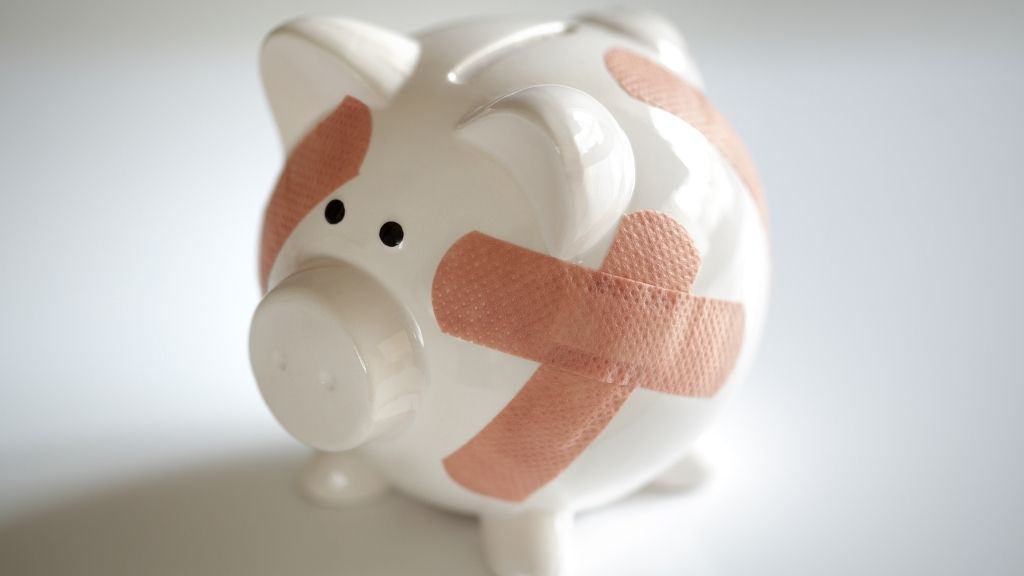Like far too many others, I used to believe the crazy debt myths you hear every day. So, naturally, I began my adult life crippled under six-figure school debt. It was brutal.
But I got out. I am completely debt free. And you can be too — nothing fancy to it, just planning, focusing, and getting serious about saving. I knew there would be challenges, of course. But not in a hundred years would I have anticipated the dozens of people coming out of the woodwork telling me to go back the other way:
“Don’t waste your time fighting debt.”
“Live your life for the now.”
“You NEED debt for a thriving life.”
I expected the saving part would be hard, and it was – at first (we’ll get to that). I expected that sticking with it for months and months would be hard. And that one actually wasn’t (we’ll get to that, too).
But I never foresaw this type of feedback. Here I was, enthusiastically making what I knew was a positive change in my life, yet all around me, people were taking the debt’s side. What gives?
Internalizing these common debt myths leads to chronic financial self-harm, which makes cracking them a crucial part of the process. So if you’re ready to break through the noise, get out of debt, and take back your money for YOUR life, check out these six common debt myths you’ll hear, along with the other side of the story.
1. It’s Just the Way of Things
You’ve Probably Heard: Debt is a necessary bummer of modern life, like taxes or going to the dentist. Unfortunately, there’s no way to avoid it, so you might as well go along with it.
But… This myth is one of the most common, slippery, and insidious. It tells you to give up the fight before you’ve even begun. It normalizes owing your money to someone else forever. As if banks and other lenders are more entitled to your hard-won earnings than you are. But it’s not their money; it’s yours.
Here’s the truth: most households do end up carrying some debt with them through adult life, but it doesn’t have to be that way. It’s just the self-fulfilling result of believing this myth.
Debt is a detriment to your financial wellness. And financial health is every bit as important as your physical or mental health. In all cases, when you find yourself afflicted by something with a known remedy, it’s your duty to yourself to seek that remedy. Give it your best shot to heal that affliction.
2. The Good Debt/Bad Debt Binary
You’ve Probably Heard: Sure, you don’t want to run up too much of a credit card bill or take out a payday loan. Those are bad debts. But mortgages and car notes are good debt because they help you build equity.
But… Good debt doesn’t exist. It’s a marketing term designed to make you feel okay with giving someone else monthly interest payments ad infinitum(see #1). Some debts are worse than others, certainly. But there is no line anywhere that bifurcates “good” debt from “bad.”
The word ‘mortgage’ comes from old french, meaning “death pledge.” So tell me, how many good things do you know with a name like “death pledge?”
All debts require you to pay extra money (interest) on top of the original cost of something. They are recurring costs with no recurring value to you. And they all stand steadfastly in the way of you building wealth, achieving financial freedom, and living life on your terms.
And, crucially, all debts work around the clock, even on holidays, to cost you money rather than to make you money (investments do the opposite).
Sure, some debts are flat-out vicious, and others have manageable payments and help you acquire something valuable. But neither of these things is your friend.
Watch out for the Leverage Loophole (see #4). Avoid debt entirely, if at all possible. Keep it as small as you can if not. And when you do find yourself owing money, pay it back aggressively, with all the intensity you can muster. The best debt of all is no debt.
3. Use Debt to Boost Your Credit
You’ve Probably Heard: You have to carry some debt to build up your credit score. Everyone knows that a high credit score marks a healthy financial life. So even if you could buy something in cash, it’s sometimes better to take out a loan and pay that off to boost your credit!
But… Have you ever paused to think about what a credit score really is? Essentially, it is a number that measures how good a job you’ve done at staying in debt: How many loans and credit lines you have, how long you’ve had them, and how well you’ve paid the bills on them.
Why do you want a high credit score? Well, it helps you to acquire NEW debt, of course!
One more question: who defines, tracks, and distributes your credit score? That would be the credit industry. Now, why on Earth would the credit industry create an arbitrary formula that rewards you for having debt and encourages you to take on more debt to improve your chances of acquiring still more debt in the future? I suppose it’s anyone’s guess.
HMMMMMMMMM.
Ask the butcher how to solve any problem, and he’ll say you need meat. Likewise, ask the people who sell loans about your financial decisions, and they’ll tell you you need loans.
When it comes to credit scores, put your financial health first. Taking steps that are good for your life and money will usually lead to a strong score anyway. Don’t get caught up playing the game and wasting your money to earn the big banks’ stamp of approval. You don’t need it.
4. “But It’s an Investment!” a.k.a. The Leverage Loophole
You’ve Probably Heard: It’s not consumer debt; it’s 🌟🌟leverage🌟🌟 (Pause for amazement.) Clever boys and girls take on debt strategically to invest someone else’s money and keep the heaps of winnings for themselves. It’s the smart way to get rich.
But… The reality is that this one is pretty cool in theory and kind of a mess in practice. Sure, you could borrow $100 at 5%, invest it for a 7% return, pay off the loan, and walk away with $2 for “free.”
Many people learn about leverage and soon use it to excuse any debt. This excuse is what I call the Leverage Loophole. “My couch is an investment. I leveraged it because it’s going to last me for years!” Nope. Couches are not investments; sorry, my friend. If it’s not earning you money, it’s just plain old consumer debt.
The other problem with the Leverage Loophole is the risk. If your short-term investment doesn’t pan out, you’re still on the hook for the loan. And short-term investments frequently don’t pan out. If there was a quick and reliable 7% return out there waiting to be claimed, why wouldn’t the bank go get it themselves instead of lending the money to you for a measly 5%?
Leverage is a tool for growing and scaling businesses, but that doesn’t necessarily mean it’s a good idea for you and me. Corporations have massive finance wings dedicated to managing the risks of investing and finding the right opportunities.
Quick-money schemes like the Leverage Loophole are of no consequence to regular investors like you or me. The risks are always high and never necessary for good old-fashioned, reliable wealth-building. So invest your own money, and stop trying to jump the process.
5. This Loan is “Safe.” It’s a Good Deal!
You’ve Probably Heard: You can buy it on payments with no money down and 0% interest. It costs no more than buying it in cash, so there’s no reason not to do it.
But… Oh yes, there is. Or rather, there are. There are several reasons not to do it.
Retailers love offering monthly payment plans for every little thing. A finance tool that initially helped people to buy homes and then cars moved down to furniture and large appliances and has continued sneaking its way into smaller and smaller purchases. Now you can buy just about any consumer good on a payment plan. Many have enticing offers like “no money down, 0% APR!!!!” Implying that these are ‘free’ loans. How generous of them.
But think about the other side of the table – in this case, the retailers and loan servicers offering you the deal. If the loan is completely free, what do they get from this? Well, a few things:
- Normalizing your taking on unnecessary debt (see #1)
- Keeping you focused on the credit score game (see #3)
- Convincing you to buy something you otherwise wouldn’t
- Buckets and buckets of fees and interest if you step even slightly out of the bounds of the loan terms (read the fine print if you like to be horrified)
If you’re trying to buy something smaller than a house and don’t have the money to pay the full price today, then you shouldn’t be buying it yet. Plain and simple. That’s the way it’s always been, and no innovation from loan companies will change it. Retail loans are just another way of tricking you into paying above the asking price for something you already don’t have the money to buy. A reverse discount, if you will.
6. I’ll Never Get Out of Debt
You’ve Probably Heard: Of course I don’t want to be in debt, but what can I do about it? I can barely keep up with my minimum payments. I’m just going to be stuck in debt forever.
But… You can do it. It seems impossible at first; I get it. I’ve been there. But I got out, and it’s way more doable than you may think.
It’s excruciatingly slow at first. It’s a nightmare to keep up with minimum payments, let alone pay any extra principal. When I started, my minimums alone cost more than my monthly rent.
The beginning is the worst part. But it does get better. The first day of paying down debt is the deepest in debt you will ever be. But you can climb. Slowly at first. Tune out the debt myths and start pushing. And when you begin to gain momentum and see your progress, it will light a fire in you. One that inspires you to push harder and get out even faster.
Whether you use the snowball or avalanche methods (the two leading approaches to paying down debt), the landscape shifts as you go. Either way, there is progressively less principal at each step, gradually generating less interest. Your energy level and momentum will continue to grow even as the debt monster diminishes and fades.
If you take this process seriously and focus on getting out instead of perpetuating these silly debt myths, you will become debt free. Start pushing, get the wheels turning, and you will accelerate like you wouldn’t believe.


Great Read and great reminder to pay down debt and make that a priority!
Thanks for sharing this